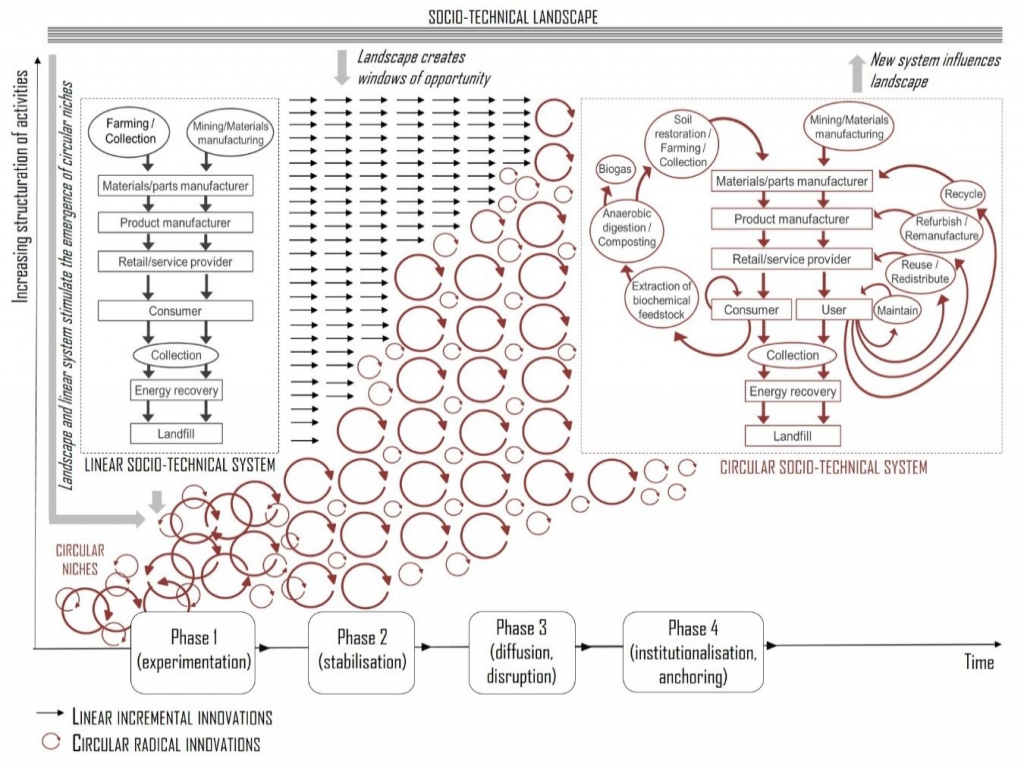Alessia Lombardi, Antonio Paparella, Roberto Freda, Francesco Caracciolo, Riccardo Vecchio, Stefano Pascucci (Exeter University, UK)
Over the last few years, the discourse on enhancing the sustainability of global industrial systems has increasingly focused on closed-loop supply chains and business models, and the idea that efforts should be made for a transition into a circular economy (CE) has gained momentum. CE aims to reshape global industrial systems following the ideal objective of a zero-waste economy. In general terms, a CE transition is seen as an agenda to redirect the path of economic development and revert societal and environmental effects to earlier stages in which planetary boundaries were not exceeded. In the past, the natural environment was able to cope with the amount of natural resources extracted and of waste produced. Today, the effects of human activities exceed the resilience of ecosystems on a global scale. The CE narrative proposes a future in which the concept of “waste” is phased out. In this new economic system, by transforming waste into biological and technical “nutrients” circulating within ideally infinite loops, the extraction of natural resources and the waste produced to satisfy the needs of human societies will be significantly reduced.
ENDLESS group is active mainly on studies related to the “metabolism” of biological nutrients, more specifically as regards the agri-food system. In this domain, CE tenets suggest different transition pathways, ranging from biomimicry driven regenerative agroecological systems to technology driven biobased industrial ecosystems. Thanks to its past research activities and particularly to the current commitment in the DRASTIC project, the ENDLESS group is giving an active contribution to the analysis of the socio-economic dimension of these transition pathways.

Multi-Level perspective of CE transition
- Spada E., Carlucci D., Cembalo L. … et al. (2025). Evaluating Circular Strategies for the Resilience of Agri-Food Business: Evidence From the Olive Oil Supply Chain. Business Strategy and the Environment. DOI: 10.1002/bse.4121
- Califano G., Lombardi A., Del Giudice T., Caracciolo F., Cembalo L. (2024). Bioplastics in the basket of Italians: A hybrid framework for understanding the adoption of bioplastic food packaging. Australian Journal of Agricultural and Resource Economics, 68(4), 826-846. DOI: 10.1111/1467-8489.12578
- Giganti P., Borrello M., Falcone P.M., Cembalo L. (2024). The impact of blockchain technology on enhancing sustainability in the agri-food sector: A scoping review. Journal of Cleaner Production, 456, 142379. DOI: 10.1016/j.jclepro.2024.142379
- Paparella A., Vecchio R., Cembalo L., Lombardi A. (2023). Measuring consumer effort in circular economy initiatives in the food domain: An exploratory analysis. Heliyon, 9(2), 13373. DOI: 10.1016/j.heliyon.2023.e13373
- Borrello M., Altomonte E., Cembalo L., D’Amico V., Lombardi A. (2023). Circular Bioeconomy and the Forest-Wood Sector: Bridging the Gap between Policies and Disadvantaged Forest Areas. Applied Sciences, 13(3), 1349. DOI: 10.3390/app13031349
- Borrello M., Cecchini L., Vecchio R., Caracciolo F., Cembalo L., Torquati B. (2022). Agricultural landscape certification as a market-driven tool to reward the provisioning of cultural ecosystem services. Ecological Economics, 193, 107286. DOI: 10.1016/j.ecolecon.2021.107286
- Lombardi A., Cembalo L. (2022). Consumption Corridors as a new paradigm of sustainability. Resouces, Conservation & Recycling, 184, 106423. DOI: 10.1016/j.resconrec.2022.106423
- Borrello M., Cembalo L., D’Amico V. (2022). Redefining Wellbeing and Normality: Circular Consumption Beyond the Low Hanging Fruit. Resouces, Conservation & Recycling, 179, 106034. DOI: 10.1016/j.resconrec.2021.106034
- Raimondo M., Caracciolo F., Cembalo L., Chinnici G., Pappalardo G., D’Amico M. (2021). Moving towards circular bioeconomy: Managing olive cake supply chain through contracts. Sustainable Production and Consumption, 28, 180-191. DOI: 1016/j.spc.2021.03.039
- Borrello M., Cembalo L., (2021). Transitioning into circular food consumption practices: An analytical framework. Circular Economy and Sustainability: Volume 1: Management and Policy (Elsevier), 385-407. DOI: 10.1016/B978-0-12-819817-9.00016-8
- Borrello M., Pascucci S., Caracciolo F., Lombardi A., Cembalo L. (2020). Consumers are willing to participate in circular business models: A practice theory perspective to food provisioning. Journal of Cleaner Production, 259, 20. DOI: 1016/j.jclepro.2020.121013
- Borrello M., Pascucci S., Cembalo L. (2020). Three propositions to unify circular economy researches: a review. Sustainability, 12(10), 4069. DOI: 10.3390/su12104069
- Mennella L., Tosco D., Alberti F., Cembalo L., et al. (2020). Perspectives and challenges of small scale plant microalgae cultivation. Evidences from Southern Italy, Algal research, 45, DOI: 10.1016/j.algal.2019.101693
- Borrello M., Caracciolo F., Lombardi A., Pascucci S., Cembalo L. (2017). Consumers’ Perspective on Circular Economy Strategy for Reducing Food Waste, Sustainability (Switzerland), 9(1), 141. DOI: 10.3390/su9010141
- Borrello M., Lombardi A., Pascucci S., Cembalo L. (2016). The Seven Challenges for Transitioning into a Bio-based Circular Economy in the Agri-food Sector, Recent Patents on Food, Nutrition and Agriculture, 8(1), 39-47. DOI: 10.2174/221279840801160304143939
- Cembalo L., Pascucci S., Tagliafierro C., Caracciolo F. (2014). Development and Management of a Bio-Energy Supply Chain Through Contract Farming, International Food and Agribusiness Management Review, 17(3), 33-52.
- Cembalo L., Caracciolo F., Migliore G., Lombardi A., Schifani G. (2014). Bioenergy chain building: a collective action perspective, Agricultural and Food Economics, 2(1), 18. DOI: 10.1186/s40100-014-0018-x
Projects
- PNRR-AGRITECH (Task8.4.1 leader) National Research Centre for Agricultural Technologies, SPOKE 8: Circular Economy in Agriculture through waste valorization and recycling.
- PRIN-DRASTIC: Driving the Italian Food System into a Circular Economy Model.
- BIODEGRAPACK: Bioplastic related project for organic food packaging
- ENERBIOCHEM: Integrated agroindustrial supply chain with high energy efficiency to produce eco-compatible energy and bio-chemicals from renewable resources and territorial valorization – funded by the Italian Government with EU funds.
- BIOPOLIS: Building a public-private consortium to research and development of biochemicals from renewable sources by using ecosustainable processes, aiming at valorising territories of the Campania Region – funded by the Italian Government with EU funds.
- DAESC: Development of agro-energy supply chain in the Campania Region – funded by the Campania Region, Italy.
- RRWC: Recover and reuse of woody biomasses in Campania – funded by the Campania Region, Italy.
- AESC: Agro-energy supply chains for territorial development in province of Avellino – funded by the province of Avellino, Italy.


